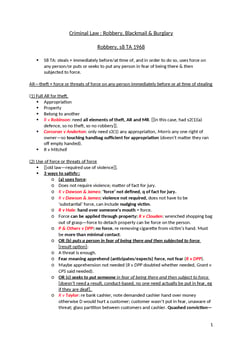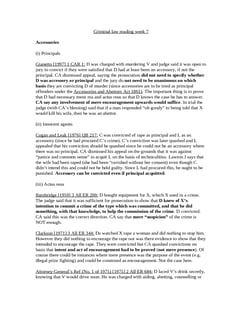Judgement for the case R v Shivpuri
KEY POINTS
Attempted drug importation, particularly involving heroin, falls under the Customs and Excise Management Act 1979 (c. 2), section 170 (1) (b). The Criminal Attempts Act 1981 (c. 47), section 1, outlines legal provisions regarding attempts to deal with or harbor drugs, as defined by relevant statutes.
Drug importation laws consider the belief that the substance is heroin, evaluating whether it qualifies as a drug within the legal context.
House of Lords decisions are influential in interpreting laws about drug importation, prohibition, and related activities. The House of Lords and Supreme Court can overturn precedents, enabling legal interpretations to evolve.
Overruling precedents are applicable even in criminal law, maintaining the law's responsiveness while balancing certainty for justice.
FACTS
The appellant was charged with attempting to deal with and harbor a controlled substance, heroin, violating the Criminal Attempts Act 1981 (section 1) and the Customs and Excise Management Act 1979 (section 170).
He was found with a package containing a powdered substance and similar material at his residence. He admitted drug possession during police interviews and composed a confession statement.
The appellant doubted the substance was heroin, which analysis confirmed as non-drug. Despite this, he was convicted and appealed, arguing that his conviction was unjust since the substances weren't drugs.
The Court of Appeal (Criminal Division) upheld his conviction.
JUDGEMENT
-
Court dismissed the appeal and held that where a person was charged under section 170 (1) of the Customs and Excise Management Act 1979 with being knowingly concerned in harboring or dealing with goods the importation of which was prohibited, it was sufficient to prove that the person knew that the goods concerned were prohibited goods and that, irrespective of the different penalties attaching to offenses in connection with the importation of different categories of prohibited goods, no proof was required that he knew the goods to be of a particular category.
Accordingly, it was immaterial that the appellant was unsure of the exact nature of the substance in his possession in that in any event he believed that he was dealing with either heroin or cannabis the importation of which was prohibited.
COMMENTARY
Drug import attempts, particularly heroin, fall under the Customs and Excise Management Act 1979 (c. 2), section 170 (1) (b), while the Criminal Attempts Act 1981 (c. 47), section 1, pertains to attempts involving drugs. The substance's identification as heroin affects its legal status.
House of Lords decisions influence drug laws, and both the House of Lords and Supreme Court can reshape legal interpretations by overturning precedents.
The appellant faced charges for trying to handle and harbor heroin, violating the Criminal Attempts Act 1981 and Customs and Excise Management Act 1979. Despite a non-drug substance, his admission led to a conviction.
His appeal was denied. The Court of Appeal determined that knowing prohibited goods was adequate under the Customs and Excise Management Act 1979, section 170 (1). The specific category didn't matter; the appellant's uncertainty about the substance didn't change his belief in possessing prohibited substances.
ORIGINAL ANALYSIS
Defendant was convicted of attempting to deal drugs when, believing that he was dealing heroin, he was in fact only dealing vegetable powder.
HL said that the distinction between acts which were objectively innocent and those which were not was untenable, and that where Defendant believed he was committing a crime then he could be guilty of an attempted offence.
Lord Bridge
Rejecting his own distinction in Anderton v Ryan, said that ANY act which fails to be completed so as to lead to the completion of a crime is objectively innocent.
E.g. If I try to kill you but fail, in the context of murder, my act is objectively innocent. Therefore if we are to say that objectively innocent acts confer no liability, then there would be no such thing as an attempted crime and S.1 would be meaningless.
Lord Hailsham
-
Shows that the ordinary meaning of S.1 contradicts the reasoning in Anderton v Ryan:
In this case, Defendant intended to do something illegal and did something more than merely preparatory to this crime (not necessarily true: he did something that he believed was more than merely preparatory to the crime).
RELATED CASES
For Further Study on R v Shivpuri

A collection of the best GDL notes the director of Oxbridge Notes (an O...
Need instant answers? Our AI exam tutor is here to help.
Ask questions 🙋 Get answers 📔 It's simple 👁️👄👁️
Our AI is educated by the highest scoring students across all subjects and schools. Join hundreds of your peers today.
Get StartedRelated Product Samples
These product samples contain the same concepts we cover in this case.
| GDL Criminal Law | Inchoate Offences Notes (13 pages) |
| Criminal Law | Inchoate Offences Notes (23 pages) |

 Since 2010, Oxbridge Notes has been a trusted education marketplace, supplying high-quality materials from top achievers at universities like Oxford, Cambridge, LSE, Harvard, and Yale.
Since 2010, Oxbridge Notes has been a trusted education marketplace, supplying high-quality materials from top achievers at universities like Oxford, Cambridge, LSE, Harvard, and Yale.